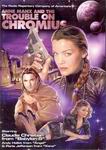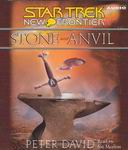
Check out the Hugo Winners page – we compiled a list of all the Hugo winners and audio editions of those works, if they exist. We hope you find it helpful!
Posted by Scott D. Danielson

Check out the Hugo Winners page – we compiled a list of all the Hugo winners and audio editions of those works, if they exist. We hope you find it helpful!
Posted by Scott D. Danielson

 Anne Manx and the Trouble on Chromius
Anne Manx and the Trouble on Chromius
Starring Claudia Christian, Andy Hallet, and Paris Jefferson
Written by Larry Weiner
Duration: 1 hour, 45 minutes
Format: 2 Audio CD’s, also available at Audible.com
ISBN: 0966039289
Producer: The Radio Repertory Company of America
Themes: / Science Fiction / Mystery / Private Eye /
You know the story. Smart-ass female private eye gets embroiled in something that’s more than she bargained for. Using her brains, attitude, and savvy, she saves the day. Think V.I. Warshawski or Kinsey Milhone. The difference here is that we’re talking science fiction and the setting is somewhere like the planet Chromius instead of New York or Chicago. But still… familiar territory.
Though the plot elements aren’t uncommon, the overall production certainly is. Claudia Christian heads a very good cast in this well-produced satirical radio drama that reminds me how entertaining radio drama can be. This is real radio drama that pulls you in and doesn’t let go.
Whether Claudia Christian is trading barbs with another character or questioning an informant, she presents a believable and hilarious main character. Her sidekick, played by Andy Hallet, made me laugh out loud more than once. The original music was also quite good, as were the sound effects. Through good headphones, I was fully immersed in the action-packed story.
Anne Manx and the Trouble on Chromius won the Gold Mark Time Award for Best Science Fiction Audio of the year 2002. Story by Larry Weiner, produced by Angelo Panetta for the Radio Repertory Company of America. Find the entire credit list here, and LISTEN TO A SAMPLE here.


 The Moon Moth
The Moon Moth
By Jack Vance; adapted by George Zarr
Performed by a Full Cast
Duration: 73 minutes 22 seconds
Available at: http://www.scifi.com/set/playhouse/moth/
Producer: Seeing Ear Theater
Themes: Science Fiction / Mystery / Aliens / Identity / Sociology /
A tone-deaf detective pursues a singing assassin through an opera of blood in this classic satirical thriller by Jack Vance. On the planet Sirene everyone wears a mask according to his status — or strahk — in society. Communication is accomplished through singing accompanied by a plethora of instruments, each of which signifies a different emotional mood or is used to talk to a different social caste. The problem is, the assassin Angmark is a master of Sirenese customs and — like everyone else on Sirene — his face is hidden behind a mask. Our doddering ambassador-detective’s only hope: to learn to use his own mask — the lowly Moon Moth — before Angmark relieves him of a head to put it on.
“The Moon Moth” is one of the best short science fiction stories tackling ideas of alternative social systems. Most stories of this type are found in full length novels like Robert Silverberg‘s A Time Of Changes or Ursula K. Le Guin‘s The Left Hand Of Darkness, but what is so delightful about this story is how densely packed with excellence it truly is. “The Moon Moth” is whimsical story with a truly original alien culture, the tale is part social commentary, part social satire and an absolutely terrific variation on the locked room mystery all packed successfully into 73 minutes of goodness! David Garrison and the rest of the Seeing Ear Theater cast are hilarious and effective but the real kudos has to go to George Zarr who so skillfully adapted Jack Vance‘s 1961 short story to the audio drama form. And unbeleivably, this play is still available for free on the internet! Very highly recommended!

 Star Trek New Frontier: Stone and Anvil
Star Trek New Frontier: Stone and Anvil
By Peter David; Read by Joe Morton
4 CD’s; 4 hours [ABRIDGED]
Publisher: Simon and Schuster
Published: 2003
ISBN: 0743533283 (CD), 0743533275 (Cassette)
Themes: / Science Fiction / Star Trek / New Frontier / Federation / Murder / Genetic engineering /
Peter David’s Star Trek: New Frontier series has been consistently excellent. Stone and Anvil is the 14th book in the series, six of which have been produced as audiobooks.
This book has Ensign Janos of the USS Excalibur under suspicion of murder. Captain Mackenzie Calhoun doesn’t believe Janos is guilty, and investigates. Through flashbacks into Calhoun’s past, the mystery is unraveled, culminating in a confrontation between Calhoun’s Excalibur and Picard’s Enterprise, and an exploration of the ethics and practice of genetic engineering.
Personally, I’ve had a lot of fun with Peter David’s novels. I think it’s safe to say that he’s my favorite of the Trek novelists – among my favorites are his Imzadi and Q Squared. In the New Frontier novels, he has the sandbox all to himself, and he seems to be enjoying himself. Along with the character of Calhoun, he brings in several secondary characters from TNG – for example, his wife is Captain Elizabeth Shelby of the USS Trident, who first appeared in the TNG episode The Best of Both Worlds. Ambassador Spock plays a role, and the Enterprise and crew show up as well. David’s playful style is infectious, and the result is very entertaining.
Joe Morton narrates, which is wonderful. He plays the moments perfectly. One thing that sticks in my mind about this one is the confrontation between Captains Calhoun and Picard. Morton successfully paints the picture with his voice, convincingly acting each character. Another: Calhoun’s handling of the infamous Kobayashi Maru exam. Morton’s timing, whether adding tension or humor, is impeccable.
Stone and Anvil, like all of the New Frontier novels I’ve read, is a cut above the average Star Trek novel. There is no need to go to the beginning and listen to the others before listening to this, but after you hear this one, you’ll want to.

 Big news for Hitchhiker fans! (Yes, I am one…) In February, 2004, on BBC 4 Radio, The Hitchhiker’s Guide to the Galaxy radio series will continue! From the Crazy Dog Audio Theatre website (go there for the full story):
Big news for Hitchhiker fans! (Yes, I am one…) In February, 2004, on BBC 4 Radio, The Hitchhiker’s Guide to the Galaxy radio series will continue! From the Crazy Dog Audio Theatre website (go there for the full story):
BBC RADIO 4 presents an ABOVE THE TITLE PRODUCTION
THE HITCH HIKER’S GUIDE TO THE GALAXY
by DOUGLAS ADAMS
THE TERTIARY, QUADRENARY & QUINTESSENTIAL PHASES:
“LIFE THE UNIVERSE AND EVERYTHING”,
“SO LONG & THANKS FOR ALL THE FISH”
& “MOSTLY HARMLESS”
Twenty-five years after the original radio series of DOUGLAS ADAMS’ HITCH HIKER’S GUIDE TO THE GALAXY exploded into the public consciousness, the further exploits of its bewildered hero ARTHUR DENT are being brought to life in their original medium.
Drawn from Douglas Adams’ later Hitch Hiker novels, the adventures continue in LIFE, THE UNIVERSE AND EVERYTHING, which will be dramatised in six half hour episodes, SO LONG AND THANKS FOR ALL THE FISH and MOSTLY HARMLESS, which will comprise four episodes each.
As the original two series were dubbed the PRIMARY and SECONDARY phases by Douglas Adams, these new series form the TERTIARY, QUADRENARY and QUINTESSENTIAL phases, and will at last finish the ‘trilogy in five parts’.
The original Hitch Hikers radio cast is returning; SIMON JONES as Arthur Dent, GEOFFREY McGIVERN as Ford Prefect, SUSAN SHERIDAN as Trillian, MARK WING-DAVEY as Zaphod Beeblebrox and STEPHEN MOORE as the much loved Marvin The Paranoid Android.
Again, more of the story on the Crazy Dog Audio Theatre website.
Posted by Scott D. Danielson

 Doomsday Book
Doomsday Book
By Connie Willis; Read by Jenny Sterlin
18 cassettes – 26.5 hours [UNABRIDGED]
Publisher: Recorded Books
Published: 2000
ISBN: 0788744151
Themes: / Science Fiction / Time-travel / England / Middle Ages / 14th Century / Near Future / Religion /
For Oxford student Kivrin, traveling back to the 14th century is more than the culmination of her studies—it’s the chance for a wonderful adventure. For Dunworthy, her mentor, it is cause for intense worry about the thousands of things that could go wrong. When an accident leaves Kivrin trapped in one of the deadliest eras in human history, the two find themselves in equally gripping—and oddly connected—struggles to survive.
Connie Willis’ The Doomsday Book is a believable time-travel story, which is ridiculous. Time-travel isn’t possible except as fiction, but the time travel in this story immerses the listener enough so that you don’t mind how you got there. Though soft science fiction, this novel relies on solid storytelling without inconsistencies, it also avoids violence and gadgets in favor of verisimilitude and thorough research. The novel follows two threads, one extremely compelling the other far less so. The first and more interesting thread follows our heroine, Kivrin, a historian sent back into the 14th century to get a first hand account of life in a village close to “Oxenford”. What she discovers there is extremely interesting. Willis dispels the ‘back in the good old days’ mentality with a gritty look at a deeply religious society and thoroughly stratified society with freezing peasants. The characterization here is superb; I actually cared what happened to these fictional medieval characters!
The shorter, secondary thread follows the characters in our near future. Unfortunately this part of the story, like the Harry Potter novels, describes a world where most adults are ignorant and need a youngster to save the day. Also here, apparently, time-travel is no big deal. It generally goes on unsupervised in the universities and without government supervision. It seems any time travel that would cause a paradox cannot occur, thus carefully avoiding the bread and butter of typical time-travel adventures. This is not a story so much about the process, the physics or paradoxes inherent in time-travel as much as it is about something else entirely: Disease and the devastating effects it has when it’s rampant and 90% lethal. Sterile modern hospitals are contrasted with the complete ignorance of infections to good effect, demonstrating just how lucky we are! It’s striking to hear how death was an everyday commonplace occurrence, unlike today when a single death is considered a tragedy. Here’s to tragedy.
The narration, by Jenny Sterlin, was very effective; she made the thoughts and words of Kivrin just like being there. Jenny effectively makes good use of the numerous British expressions in the dialogue. The title is a play on the historical ‘Domesday Book,’ which was an attempt to survey England’s land, people and wealth in the Middle Ages. Without spoiling the plot, I’ll tell you this much, it is an apt title.
Without time-travel this would not be a Science Fiction story, but rather a historical piece. Even though there are no spaceships, robots or groundbreaking or new scientific ideas I would recommend this audiobook for its suspense, mystery, and realism. That said, I still wouldn’t classify this Hugo and Nebula award winner in the same class Neuromancer or Dune, but then that’s a hell of a lot to live up to.
The cover art captures the subject matter perfectly, the compact cassette box is of high quality, but the tapes themselves had a continuous hiss. The introduction should have been an afterword since it didn’t have any impact until I re-listened to it after the novel finished. In the introduction Brother John Clinn, an actual historical figure, invites someone to continue his chronicles before his death in his manuscript. The fictional historian Kivrin, in a sense, fulfills his wishes.
Posted by Jesse Willis